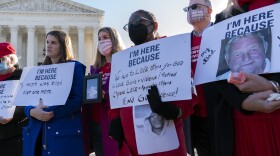Krishnadev Calamur
Krishnadev Calamur is NPR's deputy Washington editor. In this role, he helps oversee planning of the Washington desk's news coverage. He also edits NPR's Supreme Court coverage. Previously, Calamur was an editor and staff writer at The Atlantic. This is his second stint at NPR, having previously worked on NPR's website from 2008-15. Calamur received an M.A. in journalism from the University of Missouri.
-
The U.S. Court of Appeals for the Federal Circuit granted the Trump administration's request to temporarily put on hold the New York-based Court of International Trade judgment that struck down President Trump's tariffs.
-
Members of the congressional progressive caucus have withdrawn a letter urging President Biden to adjust his approach to the war in Ukraine.
-
It's the first major gun case at the court since 2008, when the court ruled that the Second Amendment right to keep and bear arms grants individuals the right to keep a gun at home for self-defense.
-
"If the Democrats can do it, the Republicans can do it," Supreme Court Justice Stephen Breyer told NPR's Nina Totenberg.
-
But the justice was philosophical about the outcome: "I wrote a dissent — and that's the way it works," he said. The decision was part of what court watchers call the "shadow docket."
-
The court's six conservative justices said the CDC exceeded its authority by issuing the two-month pause on evictions in much of the country.
-
The Trump Justice Department sought metadata from Apple to investigate members of the House Intelligence Committee, a source tells NPR. Democratic leaders want former attorneys general to testify.
-
President Biden on Saturday recognized the World War I-era mass killing and deportation of Armenians as genocide — a move that could make Turkey angry.
-
Republicans were scathing in their response to the measure, but the bill has a grim future even without their opposition. House Speaker Nancy Pelosi said she has no plans to bring it to the floor.
-
The Senate minority leader has made his decision on the article of impeachment, a source familiar with his decision tells NPR's Susan Davis.







